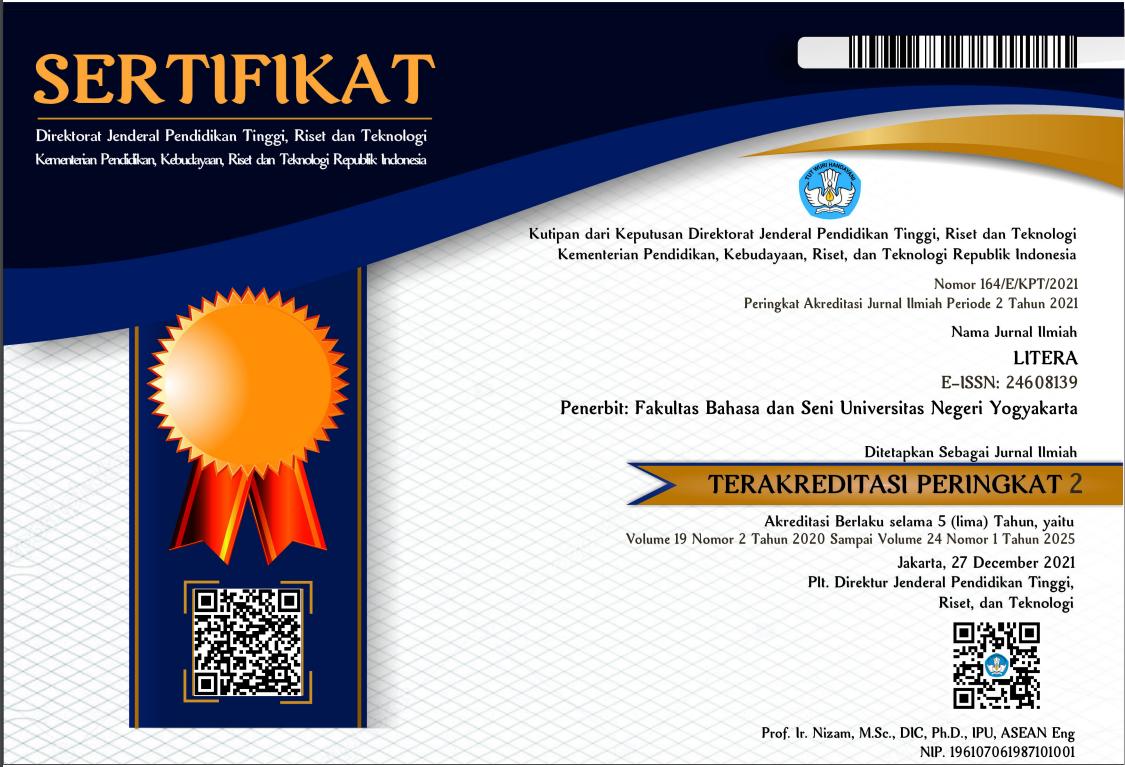LECTURERS’ POLITENESS STRATEGIES IN EFL CLASSROOM WITH MULTICULTURAL BACKGROUND
Stifania Yuliana Siba, Universitas Kanjuruhan Malang, Indonesia
Teguh Sulistyo, Universitas Kanjuruhan Malang, Indonesia
Abstract
The choice of words used by the lecturer such as politeness strategies in the classroom interaction is very important, not only for controlling the classroom but also for the process of acquiring the language itself. This study aimed to investigate lecturer’s politeness strategies in criticizing teaching performance of students with multicultural backgrounds in a microteaching class. This qualitative study was conducted with the students from multicultural backgrounds. The subject of this study was a lecturer who taught Microteaching. The findings of this study showed that there were four most frequent criticism strategies used by the lecturer: demand for change, indicating standard, advice about change and other hint. In addition, the highest proportion of politeness strategies applied by the lecturer was occupied by positive politeness, off-record strategy, bald on record, and negative politeness. It implied that the lecturer mostly applied positive politeness in criticizing the students, in order to save the students’ face, get closer and give more positive feedback to help students develop their teaching performance. The facts also proved that students’ multicultural background did not affect too much lecturer’s decision in applying politeness strategies, yet it needed to be very careful in delivering them.
Keywords: politeness strategies, criticism, multicultural backgrounds
Full Text:
PDFReferences
Agustina, S., & Cahyono, B. Y. (2016). Politeness and Power Relation in EFL Classroom Interactions : A Study on Indonesian Learners and Lecturers. International Journal of Language and Linguistics, 3(2), 92–100. https://www.ijllnet.com.
Brown, P., & Levinson, S. (1987). Politeness: Some Universal in Language Usage. Cambridge: Cambridge University Press.
Chen, I.-J. (2017). Face-Threatening Acts: Conflict Between a Teacher and Students in EFL Classroom. Open Journal of Modern Linguistics, 07(02), 151–166. https://doi.org/10.4236/ojml.2017.72012.
Consolo, D. A. (2006). Classroom Oral Interaction in Foreign Language Lessons and Implications for Teacher Development. Linguagem & Ensimo, 9(2), 151–166. Linguagem & Ensino, v.9,n.2,p.33-55,jul./dez. 2006.
Ferris, D. (2007). Preparing teachers to respond to student writing. Journal of Second Language Writing, 16, 165–193. https://doi.org/10.1016/j.jslw.2007.07.003.
Girik Allo, M. D. (2018). Intercultural Communication in EFL Classrooms. Ethical Lingua: Journal of Language Teaching and Literature, 5(2), 159. https://doi.org/10.30605/ethicallingua.v5i2.1036.
Holmes, J. (2013). An Introduction to Sociolinguistics (fourth). London and New York: Routledge.
Ide, S. (1989). Formal Forms and Discernment: Two Neglected Aspects of Universals of Linguistic Politeness. Multilingua, 8(2–3), 223–248. https://doi.org/10.1515/mult.1989.8.2-3.223.
Jiang, X. (2011). A Case Study of Teacher’s Politeness in EFL Class. Journal of Language Teaching and Research, 1(5), 651–655. https://doi.org/10.4304/jltr.1.5.651-655.
Mahmud, M. (2018). The Use of Politeness Strategies in The Classroom Context by English University Students. Indonesian Journal of Applied Linguistics, 8, 597-606.
doi: 10.17509/ijal.v8i3.15258.
Makejeva, M. (2017). Hedging and Politeness Strategies Used By Native and Non-Native English Speaking Females in Academic Settings. Lietuvos Edukologijos Universitetas.
Nguyen, T. T. M. (2008). Criticizing in an L2: Pragmatic strategies used by Vietnamese EFL learners. Intercultural Pragmatics, 5(1), 41–66. https://doi.org/10.1515/IP.2008.003.
Nunan, D. (1991). Language teaching Methodology. Englewood Cliffs: Prentice Hall Inc.
Peng, L., Xie, F., & Cai, L. (2014). A Case Study of College Teacher’s Politeness Strategy in EFL Classroom. Theory and Practice in Language Studies, 4(1), 110–115. https://doi.org/10.4304/tpls.4.1.110-115.
Sülü, A. (2015). Teacher ’ S Politeness in Efl Class. International Online Journal of Education and Teaching, 2(4), 216–221.
http://iojet.org/index.php/IOJET/article/view/76/115.
Victorina, E. (2014). Teacher's Politeness Strategy in Criticizing Classroom Presentation. pp. 6-35.
Williams, C. (2007). Rsearch Methods. Journal of Business and Economic Research, 5(3), 65–71. https://doi.org/10.19030/jber.v5i3.2532.
Yusuf, N. F., Widiati, U., & Teguh, S. (2017). Multimodal Provision in Improving Pre-Service Teachers' Competence. Indonesian Journal of Applied Linguistics, Vol.7, pp.239-246. doi: dx.doi.org/10.17509/ijal.v7i2.8126
DOI: https://doi.org/10.21831/ltr.v18i3.26494
Refbacks
- There are currently no refbacks.
______________________
__________________________________________________________________________________________________
Litera Journal is published by the Faculty of Languages, Arts, and Culture Universitas Negeri Yogyakarta in collaboration with Himpunan Sarjana Kesusasteraan Indonesia (HISKI)
The International Journal of Linguistic, Literature, and Its Teaching at http://http://journal.uny.ac.id/index.php/litera/ is licensed under a Creative Commons Attribution-ShareAlike 4.0 International License
__________________________________________________________________________________________________















